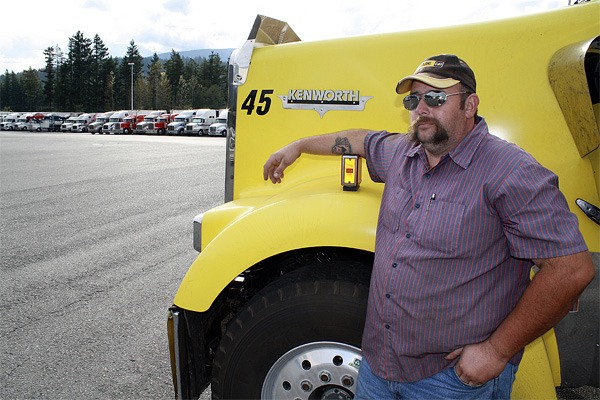Truck driver Harold Parker had found his parking space at the North Bend truck stop, and he wasn’t going anywhere.
With the busy Travel Centers of America hub filling with vehicles as evening approached last Wednesday, Sept. 22, Parker hunkered down in his cab, playing solitaire on a cell phone.
“I’m staying right here,” said the South Dakota-based driver. “At this time of day, parking gets hard to find. There’s not much room anymore.”
By law, truckers must take a ten-hour break after every 11 hours of driving. With limited truck stop choices in the Puget Sound region, truckers like Parker have to plan ahead or be out in the cold when it’s time to call it a day.
By 5 p.m. Wednesday, there were only a handful of the 170-odd stalls at North Bend still available.
“You’ll see guys parking on ramps because there is no place else to go,” Parker said.
Public meeting
Growth at the busy Truck Town hub was at the center of an hour-long discussion last week on future development in North Bend’s Tanner Annex. The city of North Bend is considering expanded trucking services, among other growth, in its newly added eastern neighborhood.
Comments were mixed at the Tuesday, Sept. 21, public hearing on development in the annex. Some residents strongly opposed a truck hub expansion for environmental and quality of life reasons. Others said expansion is inevitable, and called for strict guidelines and community involvement.
Gary Fancher, a Twin Falls Middle School parent and resident of Middle Fork Road, told the council that a truck center near the school is not in the community’s best interests.
“This will expose our kids to diesel exhaust and cancer-causing particulate matter,” Fancher said.
Fancher is concerned that the city’s no-idle rule, which takes effect after 50 percent of site value is made in improvements to land, wouldn’t come into play in a Truck Town expansion.
“The no idle rule is important. But I don’t see them doing anything in improvements that would be worth 50 percent equity,” he said. “I see that as a non-starter.”
Regional plan
A Truck Town expansion will not be allowed unless a regional freight mobility plan is developed, according to Gina Estep, North Bend’s Community and Economic Development Director.
Such a plan would incorporate strategies that mitigate impacts of expansion for North Bend and show how the trucking industry can meet its needs as a region, rather than placing all the burden on the city.
City Administrator Duncan Wilson stressed that the plan would include Seattle, Issaquah and Snoqualmie Pass along with the businesses and citizens of North Bend.
“I’m encouraged to hear that the city is not allowing expansion of Truck Town until the regional plan has been put into place,” said Middle Fork Road resident Craig Lockwood, who, along with other speakers, wants the plan to come first.
“There is no option with trucks,” said speaker Jeff Martine. “We have to have more parking, enforcement, amenities, and I don’t see any other option from expansion.”
Residents voiced a number of conditions for consideration if Truck Town were to be expanded. These included a radio system that would coordinate with regional ports to get trucks in and out more efficiently; increasing police or private security patrolling; becoming carbon neutral; and making sure the community is involved.
“I’d like to request that during the regional process and redefining all of this, the vision statement from North Bend and interests of their citizens be represented,” said resident Frank Cranney. “These are people (who) form a part of this community and their interests and opinions should be valued and given full attention.”
Growth needed
Visiting Truck Town, truckers Ray Jackson and Eddie Thomas welcomed an expanded Valley truck stop.
“Where are we supposed to go?” said Thomas, who was waiting to load his empty trailer in Seattle. “I can’t park on the side of the road.”
Roadside parking is dangerous and can carry fines, yet trucks routinely park off arterials near the North Bend stop.
“I’d rather be parked in a truck stop than beside the road,” said driver Frank Sutley. “It can be dangerous on the road.”
Truck drivers face a chewing-out or fines if they don’t make their required halts.
“We don’t make a killing anymore,” said Jackson, who was hauling an oversize tractor back to South Carolina from the Port of Seattle.
He said mandatory breaks increase pressure on drivers— and truck stops.
Truckers say they idle their engines because they need power to run heaters and air conditioners. Some companies provide secondary engines to run these systems, but many do not.
“It is what it is,” Sutley said. “You can’t burn up and you can’t die of cold.”
Sutley and other drivers said it’s tough to watch as communities develop but truck services fail to keep pace.
“The bigger a city gets, the more property they have,” Sutley said. “You need more truck stops because you’ve got more business.”



